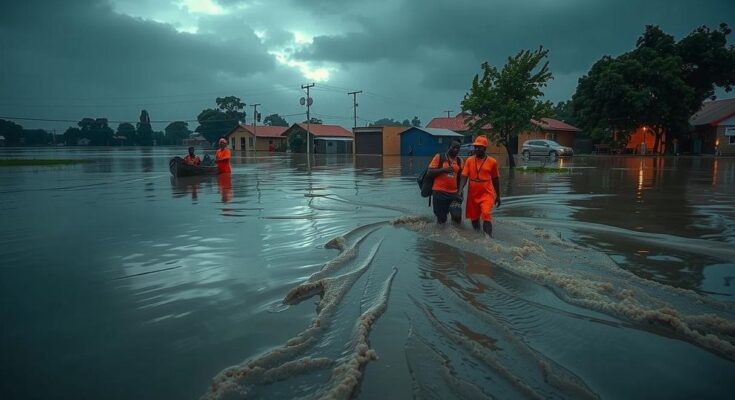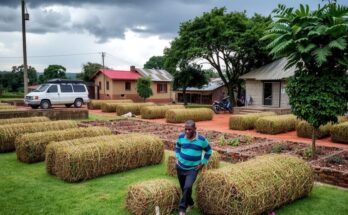South Sudan is enduring severe flooding, displacing over 226,000 people and affecting 890,000 others, exacerbating an already dire humanitarian situation marked by rising health crises such as cholera and malaria. The WHO is mobilizing efforts to provide health services and emergency kits to affected areas, emphasizing the need for stronger health systems in the face of climate change.
South Sudan is currently grappling with unprecedented flooding, which has resulted in significant challenges across the nation. The recent deluge has displaced over 226,000 individuals while inundating homes, destroying livelihoods, and crippling essential infrastructure such as roads, particularly in key counties. Flood-related impacts have been observed across 42 out of the 78 counties, leading to the submersion of 58 health facilities in five counties, in addition to hindering access to nearly 90 others. As of October 4, 2024, approximately 890,000 people are affected by these disasters. The severity of the flooding this year is attributed to climate change, which has intensified the effects of seasonal rains typically occurring between April and November. This situation arises amidst an already critical humanitarian crisis, as South Sudan is hosting nearly 800,000 refugees and returnees from conflicts in neighboring Sudan. Additionally, health concerns are escalating, with two suspected cholera cases reported in Renk County and a significant rise in malaria cases, totaling over 120,000, along with 31 suspected fatalities. Reports of snake bites have also increased sharply. In response to this crisis, the World Health Organization (WHO) is collaborating with the South Sudanese Ministry of Health, focusing on essential health services while addressing the burgeoning humanitarian needs. WHO has dispatched about 88 metric tonnes of emergency health kits to critical areas, aimed at aiding flood-hit communities, which include vital medical supplies and treatment for widespread diseases. Efforts are underway to bolster the emergency response, which involves conducting needs assessments, training health workers, and ensuring health facilities remain protected from further damage. The organization is actively monitoring health impacts and coordinating with local authorities to ensure emergency health services reach those most in need. Through concerted regional initiatives, WHO is also advocating for the development of climate-resilient health systems to counter emerging threats, emphasizing the need for robust strategies to mitigate the health effects of climate change. These measures are crucial for safeguarding the health of vulnerable populations throughout the region.
The health crisis in South Sudan has been compounded by catastrophic flooding, which has reached unprecedented levels due to climate change. It is essential to understand the geographical and socio-political context of the region. South Sudan often experiences heavy seasonal rains, but the current flooding is notably severe and widespread, resulting from a combination of climatic factors and infrastructural vulnerabilities. Furthermore, the influx of refugees from armed conflicts in neighboring nations has exacerbated existing humanitarian challenges, placing additional strain on health services and resources available to affected populations. Given this context, the response from health organizations such as WHO is critical in managing both immediate health crises and long-term public health strategies.
In summary, the flooding in South Sudan represents a significant and compounding health and humanitarian crisis, affecting hundreds of thousands. The WHO’s proactive measures to distribute vital health supplies and enhance healthcare access are crucial for alleviating the crisis. As climate conditions continue to worsen, it is imperative to prioritize the establishment of resilient health systems capable of withstanding future climatic shocks and protecting vulnerable communities.
Original Source: www.afro.who.int




